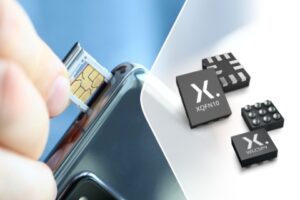Nexperia, an expert in essential semiconductors, announced the latest addition to its family of voltage level translators, the NXT4557GU and NXT4556UP. These devices enable seamless connectivity of next-generation, low-voltage mobile phone baseband processors with its subscribers’ identity module (SIM) cards.
 As processor geometries advance to single-digit nanometer nodes, the core voltage of advanced SoCs is decreasing. This development increases the need for voltage translators to connect the SoC to other standard process devices and I/O ports like legacy Class B and Class C SIM cards.
As processor geometries advance to single-digit nanometer nodes, the core voltage of advanced SoCs is decreasing. This development increases the need for voltage translators to connect the SoC to other standard process devices and I/O ports like legacy Class B and Class C SIM cards.
The NXT4557GU and NXT4556UP dual-supply translators support voltage levels between 1.08 V and 1.98 V on the host processor side and 1.62 V to 3.6 V on the SIM card side. These operating ranges make these devices compliant with legacy Class B (3.0 V ± 10%) and Class C (1.8 V ± 10%) voltage levels while maintaining compatibility with the voltage levels, which will be used by future SIM card interface standards (1.2 V ± 10%).
The NXT4557GU and NXT4556UP feature bidirectional IO and unidirectional RESET and clock channels and a smart ONE SHOT that enables very low channel propagation delays. These devices have a low operating current of 8µA with a standby current of only 1µA to help maximize the battery life of mobile devices. Integrated pull-up resistors help to further reduce power consumption in standby mode while lowering overall system BOM cost and space.
The NXT4557GU features an enable (EN) pin and is housed in a leadless XQFN10 package while the NXT4556UP is auto-enabled and comes in an ultra-small WLCSP9 package with 0.35mm pitch.
“In case of a system crash or accidental removal of battery, the power supply on the SIM card discharges to ground quickly and there remains no time for interface device to execute shutdown sequence,” said Vikram Singh Parihar, senior product manager at Nexperia. “Nexperia’s NXT4557GU and NXT4556UP take care of this ungraceful shutdown by implementing orderly shutdown of the signals and help avoid any improper write and corruption of data.”
Filed Under: Components, News, Semiconductors


Questions related to this article?
👉Ask and discuss on Electro-Tech-Online.com and EDAboard.com forums.
Tell Us What You Think!!
You must be logged in to post a comment.